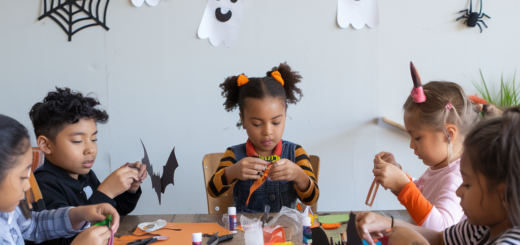Why is Family Bonding Important?
Family bonding is a crucial element that plays a vital role in shaping the dynamics and overall health of any family unit. In today’s fast-paced world, where time is a precious commodity, it becomes even more essential to understand why family bonding is important.

Strong family bonds foster feelings of love, security, and support. They serve as the foundation for personal growth, emotional well-being, and social stability.
Understanding Family Bonding
Family bonding refers to the deep connection and emotional ties that family members develop through shared experiences, mutual support, and communication.

These bonds are not only vital for individual family members but also for the family as a collective unit.
The strength of these bonds can significantly impact how well a family functions, especially during times of stress or crisis.
Historical Perspective
Historically, families have been the primary social unit where individuals learn values, cultural norms, and behaviors.

Family bonding has always been important, as it ensures the continuity of traditions and the transmission of essential life skills.
In ancient times, family structures were more extended, with multiple generations living together and supporting each other. This naturally fostered strong family bonds.
Modern Family Dynamics
In contemporary society, family structures have evolved. While extended families are less common, nuclear families are more prevalent.

Despite these changes, the importance of family bonding remains unchanged. With the advent of technology, busy schedules, and individualistic lifestyles, finding time for family bonding has become challenging.
However, its significance cannot be overstated.
Why is Family Bonding Important?
Emotional Support
Family bonding provides a robust support system. During difficult times, having a close-knit family can make a significant difference.

Emotional support from family members can help individuals cope with stress, anxiety, and depression.
Knowing that there is always someone to turn to creates a sense of security and belonging.
Development of Social Skills
Family interactions are the first social experiences individuals have. Through these interactions, children learn essential social skills such as communication, empathy, and conflict resolution.

These skills are crucial for forming healthy relationships outside the family unit.
Building Self-Esteem
Positive family interactions can significantly boost an individual’s self-esteem. When family members show appreciation, love, and respect for each other, it fosters a sense of worth and confidence.

Children who grow up in a supportive family environment are more likely to develop a healthy self-image.
Creation of Memories

Family bonding activities create lasting memories that individuals cherish throughout their lives. Whether it’s a family vacation, a holiday celebration, or simple daily routines, these moments strengthen the emotional ties between family members and contribute to a sense of unity and belonging.
Promotion of Healthy Lifestyles
Families that bond over activities such as cooking, exercising, or playing sports together promote healthy lifestyles.

These shared activities encourage positive behaviors and habits that can last a lifetime. Additionally, families that eat together are more likely to have balanced diets and better eating habits.
Academic Success
Research has shown that children from families with strong bonds tend to perform better academically. Parental involvement in a child’s education and encouragement can lead to higher academic achievement.

When children know their parents are invested in their education, it motivates them to excel.
Effective Communication
Strong family bonds are built on effective communication. Families that spend time talking and listening to each other develop better understanding and trust.

Open communication helps in resolving conflicts, making collective decisions, and expressing feelings, which are all crucial for maintaining healthy relationships.
Stress Relief
Life can be stressful, and having a supportive family can provide a safe haven. Family bonding activities, such as playing games, watching movies, or simply spending time together, can be great stress relievers.

These activities provide a break from the daily grind and allow family members to relax and enjoy each other’s company.
Cultural and Ethical Values
Family bonding is essential for passing down cultural and ethical values. Families play a significant role in teaching children about their heritage, traditions, and moral principles.

These values form the foundation of an individual’s character and influence their behavior and decisions.
Strengthening Marital Relationships
For married couples, family bonding is crucial for a strong and healthy relationship. Spending quality time together, communicating effectively, and supporting each other strengthens the marital bond.

This not only benefits the couple but also sets a positive example for their children.
Practical Ways to Foster Family Bonding
Regular Family Meetings
Holding regular family meetings where everyone can share their thoughts, feelings, and ideas is an excellent way to strengthen family bonds.

These meetings can be a platform for discussing family issues, planning activities, and making collective decisions.
Shared Activities
Engaging in activities that the entire family enjoys can create a sense of unity and enjoyment. This can include hobbies, sports, or creative projects.

The key is to find activities that everyone can participate in and enjoy together.
Family Traditions
Establishing and maintaining family traditions creates a sense of continuity and belonging. These can be as simple as weekly game nights, annual vacations, or holiday rituals.

Traditions provide something for family members to look forward to and can be a source of comfort and stability.
Open Communication
Encouraging open and honest communication is vital for family bonding. This means listening to each other without judgment, expressing feelings openly, and resolving conflicts through constructive dialogue.

Open communication fosters trust and understanding among family members.
Quality Time
Spending quality time together is perhaps the most important aspect of family bonding. This doesn’t necessarily mean spending large amounts of time, but rather making the time spent together meaningful and focused.

This could be as simple as having meals together, going for walks, or having regular check-ins with each other.
Support and Encouragement
Providing support and encouragement to each family member strengthens bonds and builds a positive family atmosphere.

Celebrating achievements, offering help during tough times, and showing appreciation for each other fosters a supportive environment.
Learning Together
Engaging in educational activities together, such as reading, attending workshops, or learning a new skill, can be a great way to bond.

Learning together not only expands knowledge but also creates shared experiences and memories.
Challenges to Family Bonding
Busy Schedules
In today’s world, busy schedules can be a significant barrier to family bonding. Work commitments, school activities, and personal hobbies often leave little time for family interactions.
It is essential to prioritize family time and create a balance between individual and family activities.
Technology
While technology has many benefits, it can also hinder family bonding. Excessive use of devices such as smartphones, tablets, and computers can reduce face-to-face interactions.

Setting boundaries on technology use and encouraging unplugged family time can help mitigate this issue.
Distance
In some cases, family members may live far apart due to work, education, or other reasons. While physical distance can be a challenge, it is not insurmountable.

Regular communication through calls, video chats, and visits can help maintain and strengthen family bonds.
Conflicts
Conflicts are a natural part of any relationship, including within families. Unresolved conflicts can create tension and weaken family bonds. It is important to address conflicts promptly and constructively, focusing on resolution rather than blame.

Conclusion
In conclusion, family bonding is a cornerstone of a happy and healthy family life. It provides emotional support, helps in the development of social skills, builds self-esteem, creates cherished memories, promotes healthy lifestyles, and contributes to academic success.
Additionally, strong family bonds foster effective communication, relieve stress, instill cultural and ethical values, and strengthen marital relationships.
Despite the challenges posed by busy schedules, technology, distance, and conflicts, there are practical ways to foster family bonding.

Regular family meetings, shared activities, family traditions, open communication, quality time, support, and learning together are all effective strategies.
Ultimately, understanding why family bonding is important and making a conscious effort to strengthen these bonds can lead to a more fulfilling and harmonious family life.
By investing time and energy into building strong family connections, we create a nurturing environment that benefits all family members, providing them with the foundation to thrive both individually and collectively.












